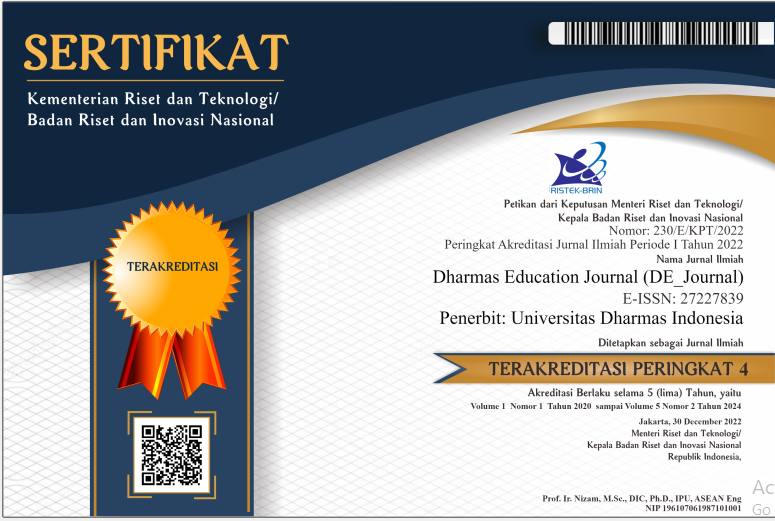EPISTEMOLOGY OF ISLAMIC EDUCATION THOUGHT ACCORDING TO MOHAMMED ABED AL-JABRI
DOI:
https://doi.org/10.56667/dejournal.v4i1.1100Keywords:
Mohammed Abed Al-Jabri, Epistemology, Thinking IslamAbstract
Going with the flow and not getting carried away, is a wise word for Mohammed Abed Al-Jabri, with the steps of modernity that he built trying to introduce his epistemological building to the western world, he is a figure who borrows a lot of old discourses and polishes them in a new style so that the originals impress as it was built until now still resonates as a discourse. Thus, the purpose of this study is to ascertain Mohammed Abed Al-Jabri's interpretation of the epistemology of philosophy in Islamic education. This is because the dominant way of thinking in the Islamic world does not take into account many aspects of progress in the West or in Europe. Therefore, when someone presents a belief or concept based on a philosophy, it arouses suspicion. This research includes qualitative literature research, which involves collecting data and information using various library materials. According to the epistemology of Islamic thought, Mohammed Abed Al-Jabri, which is based on the approaches of Bayani, Irfani, and Burhani, the epistemology of Islamic education aspires to produce and acquire knowledge.
Downloads
References
Achmad Bahrur Rozi. (2020). Etika Al-Mashlahah: Studi Pemikiran Moral Mohammad Abed Al-Jabiri. El-Faqih : Jurnal Pemikiran Dan Hukum Islam, 6(1), 96–122. https://doi.org/10.29062/faqih.v6i1.104
Adlini, M. N., Dinda, A. H., Yulinda, S., Chotimah, O., & Merliyana, S. J. (2022). Metode Penelitian Kualitatif Studi Pustaka. Edumaspul: Jurnal Pendidikan, 6(1), 974–980. https://doi.org/10.33487/edumaspul.v6i1.3394
Al-Jabiri, M. A. (2000). Post tradisionalisme Islam / Muhammad Abed Al-Jabiri ; pengumpul dan alih bahasa, Ahmad Baso ; penyelaras bahasa, Imam Baehaqi. Lembaga Pendidikan Sukarno Pressindo.
Al Ma’mun, H. (2022). Hubungan Epistemologi Keislaman Muhammad Abid Al-Jabiri dengan Tipologi Penafsiran Al-Qur’an. Journal of Islamic Civilization, 3(2), 135–148. https://doi.org/10.33086/jic.v3i2.2252
Bahri, S. (2015). Bayani, Burhani Dan Irfani Trilogi Epistemologi Kegelisahan Seorang Muhammad Abid Al Jabiri. Cakrawala Hukum, XI(1), 1–18.
Ben Hammed, M. W. (2021). (Dis)Enchanting modernity: Sufism and its temporality in the thought of Mohammed Abed al-Jabri and Taha Abdurrahman. The Journal of North African Studies, 26(3), 552–571. https://doi.org/10.1080/13629387.2019.1697241
Brahimi, M. A. (2018). The International Becoming of an Arab Philosopher: An Analysis of the Non-reception of Mohammed Abed al-Jabri in Euro-American Scholarship. In Islam, State, and Modernity (pp. 127–148). Palgrave Macmillan US. https://doi.org/10.1057/978-1-137-59760-1_7
Campanini, M. (2018). Mohammed Abed al-Jabri and Ibn Khaldun: A Path to Modernity. Islam, State, and Modernity: Mohammed Abed Al-Jabri and the Future of the Arab World, 25–40.
Corrao, F. M. (2018). Reflections on Education and Culture in al-Jabri’s Thought. In Islam, State, and Modernity (pp. 205–218). Palgrave Macmillan US. https://doi.org/10.1057/978-1-137-59760-1_11
El Ahmadi, M. (2018). State and Religion in al-Jabri’s Political Thought. In Islam, State, and Modernity (pp. 171–182). Palgrave Macmillan US. https://doi.org/10.1057/978-1-137-59760-1_9
Eskandari, A., & Najafi, M. (2023). Methodology of Mohammad Abed al-Jaberi in Critique of Arabic Wisdom. Contemporary Political Studies, 14(2), 1–30.
Hardiono, H. (2021). Epistemologi Postrukturalisme Objek Pemikiran Islam Abed Al-Jabiri Dan Implikasinya Bagi Ilmu-Ilmu Dan Pemikiran Keislaman. TAJDID: Jurnal Ilmu Ushuluddin, 19(1), 110–138. https://doi.org/10.30631/tjd.v19i1.119
Hegasy, S. (2018). “Dare to be Wise!” On the Reception of al-Jabri Post-2011. In Islam, State, and Modernity (pp. 183–204). Palgrave Macmillan US. https://doi.org/10.1057/978-1-137-59760-1_10
Jebari, I. (2018). An Intellectual Between the Maghreb and the Mashreq: Mohammed Abed al-Jabri and the Location of Thought. In Islam, State, and Modernity (pp. 79–108). Palgrave Macmillan US. https://doi.org/10.1057/978-1-137-59760-1_5
Kersten, C. (2018). Al-Jabri in Indonesia: The Critique of Arab Reason Travels to the Lands Below the Winds. In Islam, State, and Modernity (pp. 149–167). Palgrave Macmillan US. https://doi.org/10.1057/978-1-137-59760-1_8
Kynes, J. (2020). The Function of Bachelardian Epistemology in the Post-colonial Project of Mohammed ‘Abed al-Jabri. In Religion in Motion (pp. 221–237). Springer International Publishing. https://doi.org/10.1007/978-3-030-41388-0_12
Laviano, M. (2018). Al-Jabri and His Introduction to the Qur’ān. In Islam, State, and Modernity (pp. 109–125). Palgrave Macmillan US. https://doi.org/10.1057/978-1-137-59760-1_6
Muhammad Iqbal, Muhammad, N. R. (2022). MB-KM Curriculum Planning in Improving The Quality Of Graduates In Era 5.0 (Case Study at Jabal Ghafur College Of Health Sciences). 1(1), 16–21.
Niam, A. (2021). Metode Penafsiran Kontemporer Abid Al-Jabiri. Jurnal Ulunnuha, 10(1), 1–12. https://doi.org/10.15548/ju.v10i1.2251
Pangestutiani, Y. (2020). Pemikiran Muhammad Abied Al-Jabiri Sebagai Proyek Kebangkitan Islam. 21(1), 1–9.
Parray, T. A. (2018). Islam, State and Modernity: Mohammed Abed al-Jabri and the Future of the Arab World. American Journal of Islam and Society, 35(3), 90–92. https://doi.org/10.35632/ajis.v35i3.487
Supriatna, E. (2019). Islam dan Ilmu Pengetahuan. Jurnal Soshum Insentif, 128–135. https://doi.org/10.36787/jsi.v2i1.106
Titian Ayu Naw Tika. (2021). Pemikiran Epistimologi Abid Al-Jabiri Dan Implikasinya Bagi Dinamika Keilmuan Islam. JOURNAL SCIENTIFIC OF MANDALIKA (JSM) e-ISSN 2745-5955 | p-ISSN 2809-0543, 2(12), 612–621. https://doi.org/10.36312/10.36312/vol2iss12pp612-621
Tohari, A. (2017). Epistemologi Pemikiran Islam Menurut Muhammad Abid Al-Jabiry. Al-Iman: Jurnal Keislaman Dan Kemasyarakatan, 1(01), 39–66.
Downloads
Published
How to Cite
Issue
Section
License
Copyright (c) 2023 Dharmas Education Journal (DE_Journal)

This work is licensed under a Creative Commons Attribution-NonCommercial-NoDerivatives 4.0 International License.
Makalah yang disampaikan diasumsikan tidak mengandung bahan propietary yang tidak dilindungi oleh hak paten














